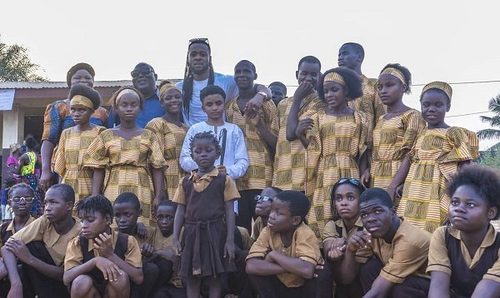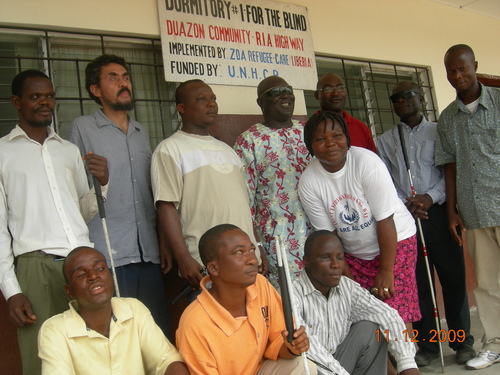LEGAL STATUS AND CORE FOCUS AREA OF CAB
What is CAB's Legal Status? What are CABís Programs? What does CAB do?
CAB'S LEGAL STATUS
In May of 1993,The Liberia Christian Association of the Blind [CAB], was incorporated by the government of Liberia through an act of the national legislature, as a body politic corporate, having perpetual existence and with authority to contract, sue and be sued, plead and impleaded in any court of the Republic of Liberia.
The Association in its aims and objectives is to help blind persons fellowship with one another and to serve all blind persons in their needs, to strengthen the work and foster cooperation with other local organizations and to enable blind persons to work together in peace and unity for the promotion and maintenance of justice. CAB is also vested with full power and authority to make and establish laws and regulations for its governance and to do all things and undertake acts as done by similar corporate bodies which are not repugnant to the constitution and laws of the Republic of Liberia.
By virtue of the act of 1993 incorporating the Association, CAB is legally empowered with competent jurisdiction to purchase or otherwise acquire, hold, convey mortgage or otherwise hypothecate property, real, personal and mixed up to the value of and not limited to 100,000, (One Hundred Thousand Dollars) as a non-profit corporation. The Association enjoys exemption from the payment of taxes as its accounts showing receipts and expenditures shall be opened to inspection by an official designated by the Ministry Of Finance, Republic of Liberia.
In commitment to the legal proviso ascribed to the Association by the government of Liberia, CAB launched its outreach programs in 1998 which resulted into the establishment of local branches in four of the 15 political sub-divisions of Liberia, including Tubmanburg Bomi County, Kakata, Margibi County, Buchanan, Grand Bassa County and Gbarnga, Bong County respectively. In addition, the Association in 2008, formally dedicated a National Resource Center for the Blind on the Robertsfield Highway, Paynesville City, where blind and partially sighted persons are given the opportunity to develop effective blindness skills and positive attitudes that will help them succeed in life.
The Center for the Blind is a comprehensive education and rehabilitation service program where individual blind persons are counselled to accept blindness as a challenge which they can manage effectively. Training at the Center enables the blind to appreciate that blind people are normal people who live and function competitively in society.
At the CAB National Resource Center for the Blind, we espouse to the core value that blindness is not stupidity or helplessness which could rub you of the ability to earn your daily bread or the lack of capacity to perform. Blindness is neither a tragedy to destroy your life, nor render you permanently dependent. This is why we build students’ aspiration around the principle of making the best out of our circumstances.
CORE FOCUS AREA OF CAB
CAB’s program activities focus on four broad pillars:
1. Education and rehabilitation for the social inclusion of the blind and visually impaired;
2. Capacity-building and income generation to support the needs of the blind and sustain our program;
3. Advocacy and awareness raising to advance the cause of the blind;
4. Creation of empowerment and employment opportunities for members of CAB.
ACHIEVEMENTS
Notable among the many achievements of CAB are the fact that, she led the campaign for an act to establish the state commission on disabilities, the National Commission on Disabilities (NCD) and the ratification of the U.N. Convention on the Rights and Dignity of Persons with Disabilities (UNCRPD) at the National Legislature in 2008.
CAB operates a National Resource Institute for the Blind along side with the National Resource Center for the Blind, situated on the Robertsfield Highway. The CAB National Resource Center for the Blind is the secretariat of the Association which embodies the National Resource Institute for the Blind, which is the educational arm of the organization, providing education, rehabilitation, skills training and basic social services for the blind in Liberia. The National Resource Institute for the Blind (formally called CAB Rehabilitation Institute for the Blind), was established since January, 1993, and has graduated or integrated over 75 blind and partially sighted students, some of whom are in junior and senior high schools, colleges and universities in Liberia.
The CAB National Resource Center for the Blind is situated on approximately five and a half (5.5) acres of land owned by the Association. The Center comprises a six-class room elementary school, 2 dormitories (with the capacity of about 80 students) and six-bed room clinic. CAB also operate similar facilities at its Kakata, Margibi Branch, Buchanan, Grand Bassa Branch, as well as at its Gbarnga, Bong County Branch, respectively, providing education and rehabilitation services for the blind at these local branches.
CHALLENGES
With all of the aforementioned achievements, CAB still faces a huge and very serious financial challenges, as well as logistical support, as the organization does not have a reliable source of income presently both locally and internationally. Due to the lack of funds, the Central Administration is no longer able to pay periodic visits to its local branches, and to do a number of things in terms of organizational development and membership strengthening.
We are barely managing with the Education and Rehabilitation and Integration Programs of the Association. The organization is no longer getting support from the Ministry of Education, and even when we used to receive subsidy, it was not more than three thousand United States Dollars (US$3,000) once a year. The parents are bringing their children and dashing them at the center and turning their backs. It is the Association that takes the burdens of both teaching and providing daily care of their meals, medication and even wearing (including feet wears) for these blind children. The subsidy CAB receives from the Ministry of Health and Social Welfare quarterly is as low as US$150.00
It is in this light and for many other reasons that CAB wishes to seek annual budgetary support from the government of Liberia through the National Legislature in support of its many development programs for the blind across the country.
With the needed budgetary allocation to the Association, CAB will endeavor to revamp the activities of its rural branches in Gbarnga, Bong County, Buchanan, Grand Bassa County, Kakata, Margibi County, Tubmanburg, Bomi County and Cesto City, River-Cess County, respectively. CAB wishes to also expand its empowerment programs to the blind in the Southeastern region of Liberia, particularly in the Plebo, Souloken District, where we understand there is a high concentration of the blind and visually impaired.
Our intervention in the Pleebo Souloken District area, will seek to transform the lives of the blind and visually impaired in the region, ensure their livelihood development through skill training and afford youngsters who are blind the opportunity to learn to read and write Braille, and acquire computer skill for their full integration in to the regular school.
Visit the Multi-media Center for Important Documents
Transperancy and Accountibility is at the heart of everything we do
For over 20 years now, CAB has shown great leadership ability in the fight for equality for all blind and partially sighted people in Liberia. The bulk of our efforts have been concentrated on advocacy and public awareness aimed at building a positive image about the blind and blindness itself; facilitating the enrollment of deserving blind students in the mainstream school system; securing the rights of the blind to write the national exams being administered by the West Africa Examination Council (WAEC) at the junior and senior high levels.
We are also involved with catering to many of the social and welfare needs of blind boys and partially sighted boys and girls enrolled at the association’s education and rehabilitation centers across the country. Under our able leadership, CAB has been able to establish Six local branches in six of the fifteen (15) political sub-divisions of Liberia, namely, Kakata, Margibi County, Tubmanburg, Bomi, Buchanan, Grand Bassa County, Salala, Lower Bong & Gbarnga, Bong County, as well as Cesto City, Rivercess County, respectively, in addition to its national office in Monrovia.
To date, we have a membership of 3,600 blind and partially sighted persons across the country. We have been able t o set up an agricultural program which provides and/or supplements the food intake needs and revenue income generation for sustainability within the organization.
Being an entity that caters for all categories of visual impairments (blind, partially sighted), CAB does not segregate on account of sex, age, social status, religious beliefs, etc.
CAB’s programs are centered around six major activities:
Rehabilitation and integration- this is focused on the training of the blind and partially sighted (i.e. she is currently running a school at her Monrovia headquarters for the blind). She provides literacy training (Braille reading and writing) and training in typing and mobility. The school also provides basic elementary- level academic training to prepare students for mainstream schools.
Income Generating Activities-CAB operates a farm on a two-acre land owned by it on the Monrovia- Robertsfield Highway. The main crops being cultivate include cassava, potatoes, eddoes, plantains, bananas, and others edibles. As an income-generating enterprise this project markets about 80% of its produce to enable CAB meet other pressing needs, including poverty alleviation, among its members; while the remaining 20% goes toward nutritional supplements. There is also an ongoing soap making project at the headquarters of the Margibi branch in Kakata where she provides skills training and income generation. The Buchanan branch also engages in furniture making on a smaller scale.
- Advocacy – CAB ensures through its annual white Cane Safety Day, that the sighted respect the white canes as a sign of protection and equality for the blind in mainstream society. CAB also advocates for equal treatment in areas of education, health employment, etc. from the larger society.
- Capacity Building – CAB seeks to enhance the capacity of members by the provision of training in the areas of leadership, agriculture, soap making, ADL, etc. these are also used for income generation purposes.
- Women’s Committee Department – In order to ensure the women remains united and resourceful to CAB, they are encouraged to engage in such income generating activities as petit trading and to take leadership role within the organization and mainstream society.
- Expansion of services to other parts of the country.
How are CABís Activities Implemented?
CAB’s activities are implemented through its leadership structure with the bulk of the administrative and program responsibilities falling on the national Executive Committee who are Volunteers.
Below: Photo 1- CAB National President Mr. Beyan Kota, Bill Aguire and CAB Grand Bassa Coordinator Robert Kpardo pay a visit to Ambassador Linda Thomas Greenfield, US Amb. to Liberia
Photo 2- A Cross-Section of CAB Resource Center Staff
What has CAB Achieved?
For the past nineteen (19) years, CAB shown great leadership in the fight for equality for all blind and partially sighted people in Liberia. The bulk of its efforts has been spent-on public awareness programs and strategies aimed at enhancing the social integration of the blind. A few of the achievements made so far are presented below:
Facilitating the enrollment of deserving blind students in normal school system;
Securing the right of the blind to write government exams for ninth and twelve graders;
Incorporation of CAB by the national legislature;
Increased self-esteem of blind people through diverse types of rehabilitation and integration program;
Catering to many of the physical needs of over 100 persons enrolled on its academic/ rehabilitation and in integration programs;
Establishment of 5 local branches in Margibi, Bomi, Grand Bassa and Lower Bong counties. To date, it has a membership of 3,600 blind and partially sighted persons across the country.
Establishment of an agricultural program which provides and/or supplements the food intake and income for its members.
Promulgation of national legislation in support of sound education, employment opportunity, free movement facilities and easy access to medical care for the blind;
Acquiring a national secretariat for the blind;
Training and assigning ten Human Rights monitors in five counties;
Hosting of leadership seminars for leaders and potential leaders of the organization;
Successfully leading the host of World White Cane Safety Day programs over the past years;
Successfully carrying out 30 minute advocacy radio program on five radio stations through a grant from Mercy Corp Liberia.
CAB, through its awareness campaign has been able to sensitize a large portion of the driving public and pedestrians as to the significance of the White Cane.
Gaining the right of the blind to serve at a high level in government;
Receiving of international recognition including obtaining a membership with the World Blind Union and the African Union of the Blind;
Achieving the release of about 167 blind persons entrapped in conflict zone during the Liberian civil conflict and providing them protection;
Leading a lobby with National Parliament for the ratification of the U.N Convention on the Rights and Dignity of Persons with disabilities;
Taking the lead in the establishment of the National State Commission on Disabilities, which is now fully functional and lobbying with State financial authorities and the National Legislature to make annual budgetary allocation for the operation of the commission;
Establishment of a National Resource Center for the Blind with a current enrollment of about 100 students;
Setting up of a Poultry Project to train blind and partially sighted students in poultry management.
Areas That CAB Needs Support Most
More supports are needed in the areas of education; refurbishment of CAB’s school; awareness about the needs, desire, potentials and rights; income generation activities such as; agriculture, soap making, furniture, health; program expansion and sustainability. Paramount among these is the acquisition of a National Secretariat of its own as the building currently housing the association and its functionaries is being leased.


